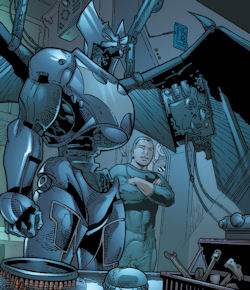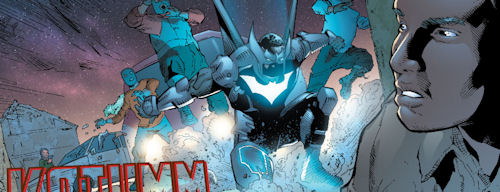 After coming in to wrap up Judd Winick’s final story arc, Fabian Nicieza gets a proper first issue on Batwing. It’s hard to judge what a new writer wants to do or how well he is doing it when his main task is to hurriedly resolve a story left hanging when the previous writer made a hasty exit. It’s a less than ideal situation for writer and reader alike, and the previous issue showed that much. Now, Nicieza gets to start a story of his own and move in the direction he plans on taking Batwing. Now, we can judge things more fairly.
After coming in to wrap up Judd Winick’s final story arc, Fabian Nicieza gets a proper first issue on Batwing. It’s hard to judge what a new writer wants to do or how well he is doing it when his main task is to hurriedly resolve a story left hanging when the previous writer made a hasty exit. It’s a less than ideal situation for writer and reader alike, and the previous issue showed that much. Now, Nicieza gets to start a story of his own and move in the direction he plans on taking Batwing. Now, we can judge things more fairly.
I’m not thrilled.
The corruption of the police department David Zavimbe works in has been more of a facet of the book’s setting than a story up thus far. That is changing as Nicieza decides to push it to the forefront and have David decide to confront his fellow police for their corruption head on. It comes off as kind of a sudden turn for the character to take. I mean, David has always had a problem with the corruption, but it seems a bit sudden that he now wants to get aggressive with it. That said, it isn’t an out of nowhere turn. It was inevitable that Batwing would eventually have to face the police corruption in his city.
Putting such a focus on the problem of the corruption doesn’t feel like a great idea to me, though. This isn’t a fight that Batwing can ultimately win. Actually, it isn’t a fight that he should win. David Zavimbe’s role as a pure, but seemingly ineffectual, cop in a corrupt department is a pretty damn good one. I’d be bored if his department ever got cleaned up. There’s nothing interesting about it. So to put Batwing on such a focused path to do so means we’re either bound to see him fail to make any real progress or succeed at making his status quo less interesting. The prospect is kind of lose-lose.
This also turns the focus away from one of the things I have enjoyed most about Batwing. The world building. Every story seemed like it gave us at least one new thing about the superhero mythology of DC’s Africa. The Kingdom, Lord Battle, Father Lost. Winick was really good about taking a superhero slant to some of the well documented problems in Africa. Child soldiers, warlords, pirates. The start of this new story by Nicieza feels lacking in that respect. No doubt police and government corruption is a problem in Africa, but it’s a problem just about everywhere else too. Add to that the relative mundaneness of how it is presented here and of the apparent lead villain of the piece. It’s a bit disappointing.
The characterization of Matu Ba takes a weird turn in this issue too. He’s suddenly pushing against Batwing’s policy of no killing. Isn’t this the guy who ran a sanctuary for children, especially reformed child soldiers? I don’t believe Matu is someone who should personally be against killing. It’s not that. It’s the oddness of having him be critical of David’s anti-killing policy, given that David is a former child soldier Matu helped reform and takes great pride in.

Last issue, I was concerned that Nicieza would overplay Batwing’s armor. The series has never quite played him entirely as Iron Man-meets-Batman. The capabilities of Batwing’s armor have generally been kept more restrained and grounded than that, which I’ve appreciated. It’s what I like in my Bat-books. Nicieza kind of threw that out the window last issue, and unfortunately, he closes the window behind it here. We now have the Batwing armor being remote controlled. This admittedly isn’t as grievous an offense as last issue’s brainwave signal emitting technobabble. But I still don’t welcome it. This is just my own personal preference, though.
Despite all of my criticisms, Batwing by Fabian Nicieza isn’t necessarily poor or wrong. Its major flaw is mainly that it fails to impress. Batwing has been an impressive book since the New 52 began. I’ve honestly argued it was one of the most impressive of that starting lineup. But now, some of those qualities that made it so impressive are absent and aren’t replaced by anything that makes up for their loss.